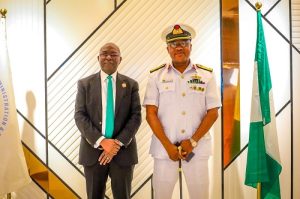Maersk Agrees to Sell Russian Terminal Investment and Grow in Malaysia

MAERSK LINE ..CREDIT WORLD MARITIME NEWS
(TME) A.P. Moller-Maersk has entered into an agreement to divest its investment in Russia’s largest container terminal operator five months after announcing its planned withdrawal from the business after the invasion of Ukraine. Maersk had previously ended container operations in and out of Russia while reporting that it was seeking to divest its minority interest in Global Ports Investments which runs seven container terminals, cargo, bulk, and Ro-Ro operations primarily in the Baltic.
In 2012, APM Terminals agreed to acquire a 30.75 percent stake in Global Port from Transportation Investments Holding Limited, one of Russia’s largest privately owned transportation groups, and jointly the two companies were managing Global Ports. The company operates six terminals in Russia, including the Saint Petersburg container terminal, which is one of the largest in Russia, as well as terminals in Finland.
Terms of the divestment were not announced, but Maersk said it agreed to sell its shares in the company to its long-standing partner Delo Group. Maersk said the transaction was undertaken on “an arm’s length basis” and includes an ability for APMT to re-enter the partnership with Delo in the future. Delo owned a 30.75 percent stake in GPI and separately operates at the port of Novorossiysk and inland ports in Russia.
“We are pleased that we have now concluded this transaction according to the plan and with our long-standing partner Delo, enabling us orderly exit from GPI in line with our decision to discontinue activities in Russia”, says Keith Svendsen, CEO of APM Terminals. The company noted that with the divestment of its shares in GPI, APMT will no longer be involved in any entities operating in Russia or own any assets in the country.
Maersk in March announced plans like most western companies to seek to end its Russian operations and sell investments in Russia. GPI’s business was hurt dramatically with a 40 percent decline in container throughput in the second quarter of 2022 and a 20 percent in TEU volumes for the first half of 2022 to 611,000 TEU total.
While exiting Russia, Maersk continues to seek other opportunities to expand its logistics operations. The company also announced today that it signed a Memorandum of Understanding with the Malaysian Investment Development Authority to drive investments into Malaysia to establish the country as one of the logistics hubs in Southeast Asia.
“Logistics is a cornerstone of Malaysia’s economy. By connecting suppliers to manufacturers, and consumers to businesses, we support the growth of various industries,” said Sivasuriyamoorthy Sundara Raja, Deputy CEO of Investment Promotion and Facilitation of MIDA. “By leveraging Maersk’s capabilities in integrated logistics, we can transform Malaysia into a regional logistics hub in ASEAN, further boosting infrastructure development and free trade.”
Maersk reports it will work with the MIDA to attract high-tech and high-impact investments in sectors including automotive, electrical and electronics, machinery and equipment, medical devices, aerospace, renewable energy, and consumer technology to Malaysia. By enhancing Maersk’s logistics strength in Malaysia, where it has operated since 1975, Maersk said it will contribute to the growth and development of the Malaysian supply chain sector.
*Culled from The Maritime Executive
In 2012, APM Terminals agreed to acquire a 30.75 percent stake in Global Port from Transportation Investments Holding Limited, one of Russia’s largest privately owned transportation groups, and jointly the two companies were managing Global Ports. The company operates six terminals in Russia, including the Saint Petersburg container terminal, which is one of the largest in Russia, as well as terminals in Finland.
Terms of the divestment were not announced, but Maersk said it agreed to sell its shares in the company to its long-standing partner Delo Group. Maersk said the transaction was undertaken on “an arm’s length basis” and includes an ability for APMT to re-enter the partnership with Delo in the future. Delo owned a 30.75 percent stake in GPI and separately operates at the port of Novorossiysk and inland ports in Russia.
“We are pleased that we have now concluded this transaction according to the plan and with our long-standing partner Delo, enabling us orderly exit from GPI in line with our decision to discontinue activities in Russia”, says Keith Svendsen, CEO of APM Terminals. The company noted that with the divestment of its shares in GPI, APMT will no longer be involved in any entities operating in Russia or own any assets in the country.
Maersk in March announced plans like most western companies to seek to end its Russian operations and sell investments in Russia. GPI’s business was hurt dramatically with a 40 percent decline in container throughput in the second quarter of 2022 and a 20 percent in TEU volumes for the first half of 2022 to 611,000 TEU total.
While exiting Russia, Maersk continues to seek other opportunities to expand its logistics operations. The company also announced today that it signed a Memorandum of Understanding with the Malaysian Investment Development Authority to drive investments into Malaysia to establish the country as one of the logistics hubs in Southeast Asia.
“Logistics is a cornerstone of Malaysia’s economy. By connecting suppliers to manufacturers, and consumers to businesses, we support the growth of various industries,” said Sivasuriyamoorthy Sundara Raja, Deputy CEO of Investment Promotion and Facilitation of MIDA. “By leveraging Maersk’s capabilities in integrated logistics, we can transform Malaysia into a regional logistics hub in ASEAN, further boosting infrastructure development and free trade.”
Maersk reports it will work with the MIDA to attract high-tech and high-impact investments in sectors including automotive, electrical and electronics, machinery and equipment, medical devices, aerospace, renewable energy, and consumer technology to Malaysia. By enhancing Maersk’s logistics strength in Malaysia, where it has operated since 1975, Maersk said it will contribute to the growth and development of the Malaysian supply chain sector.
*Culled from The Maritime Executive





